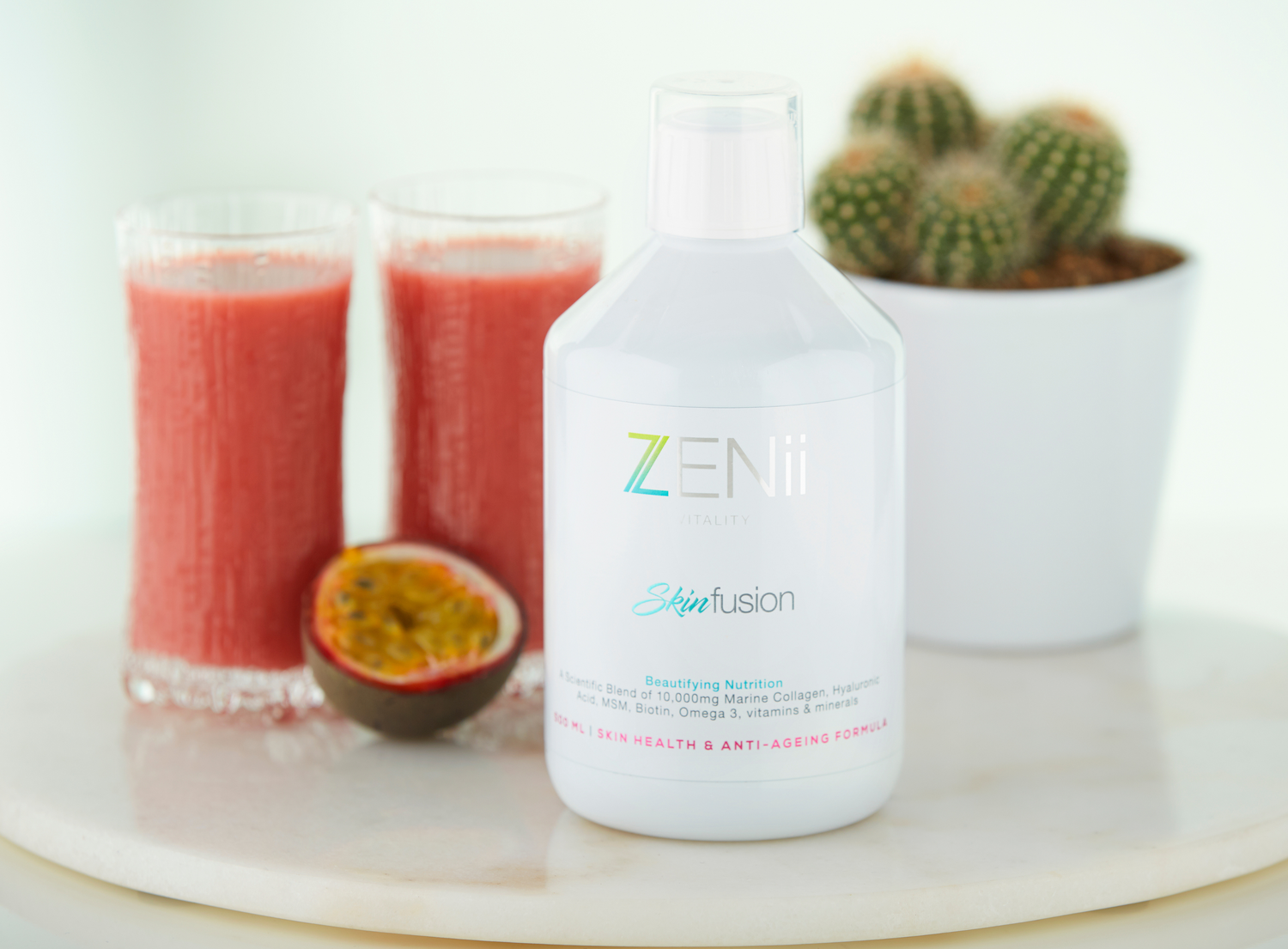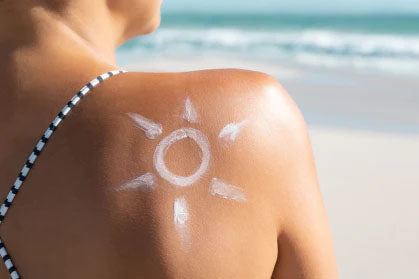I’ve been shouting from the rafters about oral collagen for some time now, and I was recently overjoyed to read another convincing publication, backing up what I’ve been witnessing in my practice for many years.
In April of this year, the nutrition journal Nutrients published the largest independent, systematic review yet of data collected in this field (1).
The authors examined the results of 26 different randomized controlled trials (RCTs) involving 1721 patients to assess the effects of hydrolyzed collagen supplementation on skin hydration and elasticity.
And, drumroll... the results showed that collagen supplementation significantly improved both skin hydration and elasticity (2), when compared to the placebo group.

Collagen: The foundation for our tissues
Collagen is the ultimate superhero of our skin. As the most abundant protein in our bodies, it forms the structural framework that keeps our skin plump, firm, and elastic.
Unfortunately, as we age, our existing collagen gets broken down, and the collagen-producing cells called fibroblasts slow down and produce less of it. There is a gradual reduction in blood flow to the skin, leading to the visible signs of aging such as thinner skin, wrinkles, fine lines, and loss of skin elasticity.
Collagen is made up of a strong triple helix of long chains of amino acids- the building blocks of proteins. The amino acids found in collagen are called Glycine, Proline and Hydroxyproline. Glycine and Proline can be taken in through our diet but Hydroxyproline, an amino acid unique to collagen, is synthesised from Proline with the help of Vitamin C, (which is why Vitamin C deficiency or Scurvy, is associated with symptoms of ineffectual collagen, like bleeding gums and bruising). In addition to Vitamin C, Zinc and Copper are also essential nutrients needed to make collagen.
There are 28 different types of human collagen, type I, II, and III are the most prevalent in the human body. Each type serves distinct functions:
Nutrients. 2023 May; 15(9): 2080.
Type I Collagen:
This type is dominant in the skin, making up 90% of the total of all collagen. tendons, ligaments, and bones, providing structural support, resilience and elasticity to these tissues. Most fish/marine collagen is type I.
Type II Collagen:
Mainly found in cartilage, type II collagen contributes to joint flexibility and cushioning.
Type III Collagen:
Often found alongside type I collagen, type III supports the structure and integrity of organs, muscles, and blood vessels.
Not only does collagen provide strength and elasticity to the skin, it is also involved in protection against UV damage, faster healing and in the production of hyaluronic acid - the key molecule involved in skin moisturization.
According to this most recent meta-analysis, the hydrating effect seems to be significantly higher in oral collagen supplements derived from fish products than from mammalian sources. So, whilst bone broth almost certainly does have its health benefits, marine collagen is likely to be what you want for optimal skin plumping!
Benefits of Oral Collagen Supplementation
- Smoothing Out Wrinkles: One of the most coveted benefits of oral collagen supplements is their ability to reduce the appearance of wrinkles and fine lines. By boosting collagen levels in the skin, these supplements help improve skin elasticity, making those pesky wrinkles a little less noticeable.
- Restoring Skin Elasticity: Say goodbye to sagging skin! Collagen supplements promote the production of new collagen fibers, restoring skin elasticity and giving your skin a firmer and more lifted appearance.
- Hydration Heroes: Dry, lackluster skin is no match for oral collagen supplementation. Collagen helps your skin retain moisture, providing a natural glow and a youthful plumpness.
- Supporting Skin Repair and Renewal: Collagen plays a crucial role in the skin's natural repair processes. By stimulating collagen synthesis, oral supplements aid in faster skin healing, reducing the appearance of scars and supporting an overall healthier complexion.
- Protection Against UV Damage: Some studies suggest that collagen peptides may help protect the skin from UV-induced damage. While not a substitute for sunscreen, collagen supplementation could potentially add an extra layer of defense against harmful UV rays.
- Combating Cellulite and Stretch Marks: Collagen's role in promoting skin elasticity may also contribute to reducing the appearance of cellulite and stretch marks, giving you smoother and more even skin texture.
Controversy over absorption (bioavailability)?
There has been much debate as to whether we can in fact, effectively absorb collagen taken by mouth. A common concern was that collagen would be broken down into single amino acids by the digestive process.
However, there is growing evidence to suggest that we can absorb chains of collagen peptides directly into the bloodstream. Some animal studies have measured the concentration of these in blood samples following ingestion of collagen, and found that they are present in their active form for up to 2 weeks after consumption.
These circulating collagen peptides are thought to increase collagen production in 2 ways – firstly, but acting directly where they are needed in the skin, where they bind to receptors on the fibroblast cells, stimulating them to produce more collagen; and second by acting as messenger proteins, which circulate in the blood (as they would after tissue injury), signalling to fibroblasts the need to ramp-up new collagen production.

Most of the studies explored in this most recent review, were based on marine source collagen supplements, but all sources showed effects of improvement in hydration and elasticity after 8 week’s use – meaning it’s not a quick-fix and any supplementation should be built into your longer-term routine.
No long-term or serious side effects have been identified and collagen supplements are widely accepted to be safe, affordable and non-invasive. Some might even go so far as to say delicious!
The studies included in this literature review and meta-analysis were generally small- but the results were consistent.
I, for one, would very much welcome more, good-quality scientific research in this exciting area, particularly as the potential benefits of collagen are widespread and far-reaching, affecting musculoskeletal health, the hair and nails, as well as immune and gut health.
Choosing the Right Oral Collagen Supplement
With a plethora of options out there, selecting the perfect oral collagen supplement can be overwhelming. In Skin Fusion, we have aimed to create, the perfect oral collagen supplement. We have combined high-quality marine collagen (at a dose backed up by scienfic study) with Hyaluronic acid and the other essential nutrients needed for creating more. We’ve been careful not to add unnecessary ingredients and to keep the formulation as pure as possible.
FORM
Hydrolyzed collagen is broken into collagen peptides for optimised absorption. Hydrolysed collagen is thought to be the only kind of collagen that can impact the skin positively and it’s what the clinical trials and data support.
DOSE
Skin fusion contains clinically evidenced 10,000mg marine collagen with hyaluronic acid, vitamins and minerals. 10,000mg marine collagen has been shown in trials to reduce the collagen fragmentation rate, stimulate synthesis of new collagen, reduce wrinkle depth and improve skin hydration.*
Additional skin-loving ingredients:
Vitamin A - helps to stimulate efficient skin cell turnover & is a powerful antioxidant)Vitamin C - an essential co-factor for collagen production & a well researched and evidenced antioxidant
Vitamin D3 - an important immune support vitamin. It helps in skin repair and prevents ageing and acne
Vitamin B6 - also helps to synthesise collagen. Deficiency causes dry, flaky skin
Vitamin B12 - reduces redness and inflammation in the skin
MSM - an organic sulphur that many people are deficient in, helps support hair, skin & nail strength
Hyaluronic Acid - a powerful skin hydrator, draws water to the skin
Magnesium - a mineral needed for cellular renewal and repair
Zinc - a mineral needed for wound healing and skin health. Zinc deficiency causes dry, red and acne prone skin.
While oral collagen supplements can offer fantastic benefits, I always stress that it’s essential to maximize their impact by adopting a holistic approach to skin health.
For optimal results, combine your collagen supplementation with a balanced diet rich in vitamins and antioxidants, regular exercise, proper hydration, and a solid skincare regimen.
As with any supplement or skincare regimen, it is advisable to consult with a dermatologist or healthcare professional before starting oral collagen supplementation.
1. Published online 2023 Apr 26 Nutrients: PMID: 37432180 Effects of Oral Collagen for Skin Anti-Aging: A Systematic Review and Meta-Analysis, Szu-Yu Pu,1,† Ya-Li Huang,2,† Chi-Ming Pu,3,4 Yi-No Kang,5,6,7,8 Khanh Dinh Hoang,9 Kee-Hsin Chen,5,10,11,12,13,14,‡ and Chiehfeng Chen2,5,6,15,*‡
2. The measurement of skin hydration level was conducted using a non-invasive tool called a corneometer. This is often used in studies to assess the effectiveness of skincare. The instrument emits a high-frequency electric current into the surface of the skin, and measures the amount of water present in the top layer. **The measurement of skin elasticity is often conducted using cutometry, a non-invasive technique that provides valuable insights into skin health. It works by applying a controlled negative pressure to a small area of the skin and measuring the resulting deformation, which is directly proportional to the skin’s elasticity. Cutometry is widely used in research and clinical settings to assess the skin elasticity levels and monitor changes in the skin over time. Overall, it is considered a safe and reliable tool for evaluating skin health.



